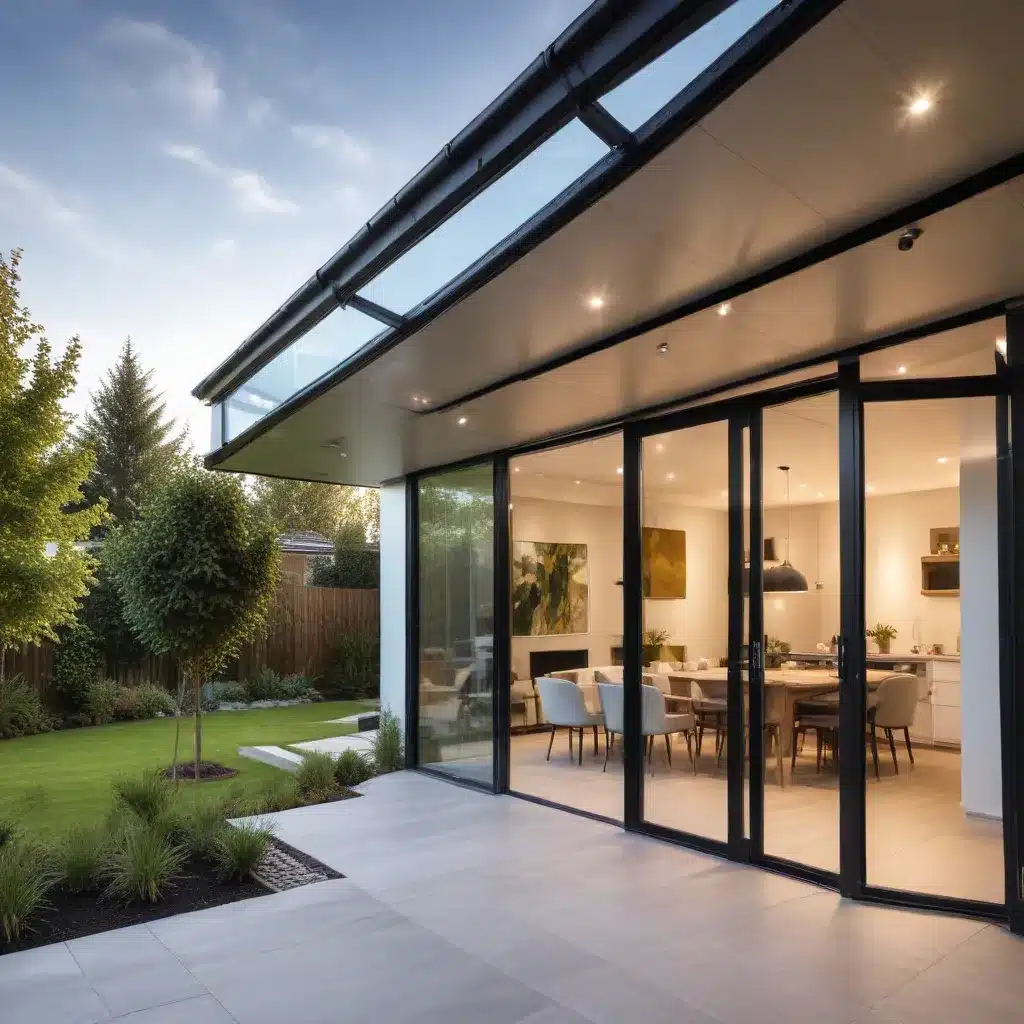
Sustainable Home Extensions: Enhancing Energy Efficiency
As an experienced home extension consultant, I’ve seen firsthand the incredible impact that sustainable design and energy-efficient upgrades can have on transforming a home. In this comprehensive guide, we’ll explore the latest strategies, materials, and technologies that can help you create a truly eco-friendly and energy-efficient home extension.
Home Design Strategies
Sustainable home design begins with a thoughtful approach to the overall layout and orientation of your extension. One of the most effective strategies is passive solar design, which harnesses the sun’s natural energy to heat and cool your home efficiently.
By strategically positioning windows, walls, and floors to collect, store, and distribute solar energy, you can minimize the need for artificial heating and cooling systems. This not only reduces your energy bills but also creates a more comfortable living environment year-round. The key is to consider the sun’s path, prevailing winds, and the specific climate of your local area when designing the layout of your extension.
Another crucial element of energy-efficient home design is thermal insulation. Proper insulation is the foundation of a well-performing, sustainable extension. By using high-performance materials like fibreglass, foam board, or spray foam, you can create a highly effective thermal barrier that keeps heat in during the winter and out during the summer. Careful attention to insulation installation, sealing gaps, and joints is essential for maximizing the efficiency of this system.
Equally important is the selection of energy-efficient windows and doors. Look for options with low U-values, double or triple glazing, and gas fills, which provide excellent insulation and reduce heat transfer. Proper installation techniques, such as ensuring tight seals and using energy-efficient frame materials, can further enhance the performance of these critical components.
Material Selection
When it comes to sustainable home extensions, the materials you choose can make a significant difference. Renewable materials, such as bamboo, cork, and reclaimed wood, are not only environmentally friendly but also often more durable and aesthetically pleasing than traditional options.
Bamboo, for example, is a fast-growing grass that can be harvested sustainably and used for flooring, cabinetry, and even structural elements. Cork, with its unique insulating properties and natural beauty, is an excellent choice for wall and floor insulation. Reclaimed wood, on the other hand, gives your extension a charming, rustic character while reducing the demand for new timber resources.
In addition to renewable materials, you should also consider the energy efficiency of your windows and doors. Opt for double or triple-glazed units with low-emissivity coatings, which can dramatically improve the thermal performance of your extension. These advanced glazing systems help to retain heat in the winter and keep it out in the summer, reducing your overall energy usage.
When it comes to construction techniques, sustainable building methods like woodcrete (a concrete-wood composite) or structural insulated panels (SIPs) can further enhance the energy efficiency of your extension. These innovative approaches often have a lower environmental impact compared to traditional building materials and methods.
Energy Efficiency Measures
Integrating renewable energy into your home extension is a surefire way to boost its sustainability and reduce your carbon footprint. Solar photovoltaic (PV) panels, for instance, can generate clean, renewable electricity to power your home, while air-source heat pumps can provide efficient, low-carbon heating and cooling.
Pairing your renewable energy system with smart home technology can take your energy efficiency to the next level. Smart thermostats, lighting controls, and appliance integration allow you to monitor and optimise your energy usage, ensuring that power is only consumed when and where it’s needed.
When upgrading your home’s appliances, be sure to choose energy-efficient models that carry high ENERGY STAR ratings. These appliances, from refrigerators and washing machines to ovens and dishwashers, can significantly reduce your energy consumption and utility bills.
Residential Retrofit Considerations
If you’re working with an existing home and planning a sustainable extension, it’s essential to start with a thorough energy assessment. This will help you identify the current performance of your home and pinpoint areas that could benefit most from upgrades and improvements.
Once you have a clear understanding of your home’s energy efficiency, you can work with a professional to conduct a feasibility analysis. This will help you determine the best strategies, materials, and technologies to implement in your extension, ensuring that your investment delivers maximum returns in terms of energy savings and environmental impact.
It’s important to note that certain regulatory requirements and permits may apply to your home extension project, particularly when it comes to energy-efficient upgrades and sustainable design. Be sure to research the local building codes and work closely with your local authorities to ensure compliance and secure the necessary approvals.
By embracing sustainable design, energy-efficient materials, and cutting-edge technologies, you can transform your home extension into a true eco-friendly haven. Not only will this enhance the comfort and livability of your living space, but it will also contribute to a more sustainable future for your family and the planet.
As an experienced home extension consultant, I’ve seen the remarkable impact that sustainable upgrades can have on a property. Whether you’re planning a new extension or retrofitting an existing home, the strategies and solutions outlined in this article can help you create a truly energy-efficient, environmentally responsible, and future-proof living space.
To learn more about our home extension services and how we can help you achieve your sustainable goals, please visit our website at https://abc-home.co.uk/home-extension/. Our team of experts is dedicated to providing tailored solutions that enhance your home’s energy efficiency, reduce your carbon footprint, and improve your overall quality of life.
















